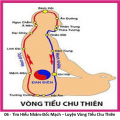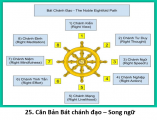Value and the spiritual life
Giá Trị Và Đời Sống Tâm Linh
English: Ajahn Brahm
Việt ngữ: Chơn Quán Trần-ngọc Lợi
Compile: Lotus group
41. Giá Trị Và Đời Sống Tâm Linh – Value and the spiritual life – Song ngữ
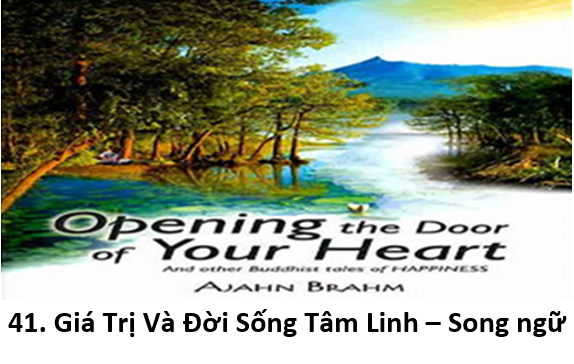
Chương 9: Giá Trị Và Đời Sống Tâm Linh – Value and the spiritual life
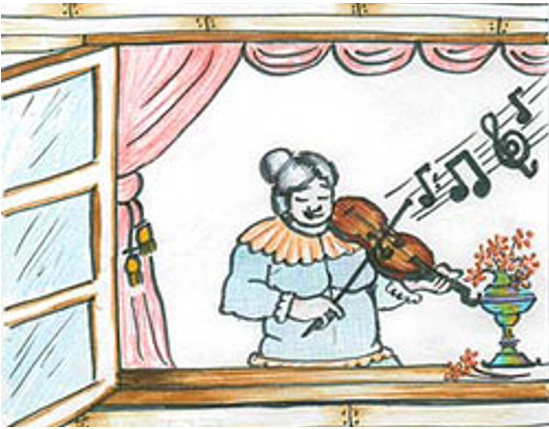
… a maestro, was performing a sonata on a violin. That would be the most beautiful sound. Hòa hợp là âm thanh đẹp nhất!
An uneducated old man was visiting a city for the first time in his life. He had grown up in a remote mountain village, worked hard raising his children, and was now enjoying his first visit to his children’s modern homes.
Có ông già nhà quê suốt đời sống với rẫy vườn trong một vùng núi non xa xôi. Nay ông xuống thành phố lần đầu tiên để thăm con.
One day, while being shown around the city, the old man heard a sound that stung his ears. He had never heard such an awful noise in his quiet mountain village and he insisted on finding its cause. Following the grating sound back to its source, he came to a room in the back of a house where a small boy was practicing on a violin. ‘SCREECH! SCRAPE!’ came the discordant notes from the groaning violin. When he was told by his son that it was called a ‘violin’, he decided he never wanted to hear such a horrible thing again.
Một hôm ông được đưa đi xem phố xá của thị thành. Ông ngạc nhiên nghe một thứ âm thanh lạ kỳ và nhất quyết tìm cho biết. Ông phăng lần đến căn phòng đằng sau một tòa nhà và thấy có em bé đang kéo đờn. Thì ra những âm thanh chói tai ò ò, e e... phát xuất từ cây đờn này. Hỏi thứ đờn gì, ông được biết đó là cây vĩ cầm. Từ dạo đó, ông nói, ông không bao giờ muốn nghe tiếng vĩ cầm nữa.
The next day, in a different part of the city, the old man heard a sound, which seemed to caress his aged ears. He had never heard such an enchanting melody in his mountain valley, so he demanded to find its cause. Following the delightful sound back to its source, he came to a room in the front of a house where an old lady, a maestro, was performing a sonata on a violin.
Hôm sau ông nghe trong một góc phố khác những âm thanh du dương như vuốt ve đôi tai già yếu của ông. Núi rừng nơi ông sanh ra và lớn lên không có các âm thanh này. Ông lại đi tìm nữa. Đến nơi ông thấy một bà đứng tuổi đang kéo vĩ cầm, bà là nhạc sư còn bản nhạc là Sonata.
At once, the old man realized his mistake. The terrible sound that he had heard the previous day was not the fault of the violin, nor even of the boy. It was just that the young man had yet to learn his instrument well.
Bấy giờ ông mới vỡ lẽ rằng mình sai. Tiếng ò e chói tai ông nghe hôm qua không phải lỗi tại cây vĩ cầm mà cũng không phải tại cậu bé. Đó chỉ là những tiếng nhạc chưa thuần thục mà thôi.
With a wisdom reserved for the simple folk, the old man thought it was the same with religion. When we come across a religious enthusiast causing such strife with his beliefs, it is incorrect to blame the religion. It is just that the novice has yet to learn his religion well. When we come across a saint, a maestro of her religion, it is such a sweet encounter that it inspires us for many years, whatever their beliefs.
Cũng vậy, trong lĩnh vực tôn giáo, nếu có ai vì quá mê muội mà gây tranh chấp đạo giáo, đạo giáo nào có lỗi gì. Nếu quy lỗi, sự mê muội là nguyên nhân gây tội lỗi vậy. Si mê thường ẩn núp trong những kẻ sơ cơ, tu chưa đến nơi đến chốn mà cô bé tập vĩ cầm là một ví dụ điển hình. Còn nhạc sư vĩ cầm tượng trưng cho các bậc thượng thừa không còn tham, sân, si; chư vị đem lại cho thế gian biết bao vị ngọt, hương thơm của đạo giáo, bất kỳ là đạo nào.
But that was not the end of the story.
The third day, in a different part of the city, the old man heard another sound that surpassed in its beauty and purity even that of the maestro on her violin. What do you think that sound was?
Chuyện chưa hết...
Ngày thứ ba, ông già nhà quê nghe được tại góc phố khác một thứ âm thanh tuyệt vời, vượt hẳn tiếng vĩ cầm của bà nhạc sư. Âm thanh gì vậy? Bạn có thử đoán được không?
It was a sound more beautiful than the cascade of the mountain stream in spring, than the autumn wind through the forest groves, or than the mountain birds singing after a heavy rain. It was even more beautiful than the silence in the mountain hollows on a still winter’s night. What was that sound that moved the old man’s heart more powerfully than anything before?
It was a large orchestra playing a symphony.
The reason that it was, for the old man, the most beautiful sound in the world was, firstly, that every member of that orchestra was a maestro of their own instrument; and secondly, that they had further learned how to play together in harmony.
Âm thanh của một dàn nhạc giao hưởng. Nhạc lúc dìu dặt như thác nước trong lành của mùa xuân, lúc vi vu như tiếng gió reo giữa rừng thu, líu lo như chim hót trên cành sau trận mưa giông. Có lúc tiếng nhạc đẹp huyền ảo như sự an lành trong hang động vào những đêm đông tĩnh mịch. Sở dĩ có được một bản nhạc tuyệt vời như vậy vì các tay đờn đều là danh cầm và vì họ biết thế nào là hòa âm.
‘May it be the same with religion,’ the old man thought.
‘Let each one of us learn through the lessons of life the soft heart of our beliefs. Let us each be a maestro of the love within our religion. Then, having learned our religion well, let us go further and learn how to play, like members of an orchestra, with other religions in harmony together!’
“Có thể nào đạo giáo được như vậy chăng?” Ông già nhà quê của chúng ta suy tư. Ông nghĩ có thể lắm chớ, nếu mỗi người chúng ta biết học lấy lòng từ qua cuộc sống và nếu mỗi chúng ta đều phát huy tâm bi trong đạo mình. Hiểu đạo mình rồi chúng ta hãy sống hòa với các đạo khác.
That would be the most beautiful sound.
Hòa hợp là âm thanh đẹp nhất!
76. What’s in a name? - Ý nghĩa của cái tên
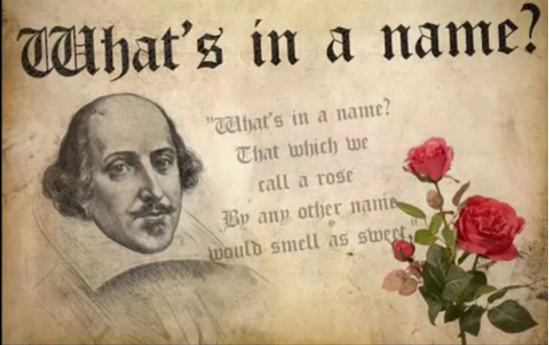
William Shakespeare’s quote
When one becomes a Buddhist monk in our tradition, one receives a new name. My monk’s name is ‘Brahmavamso’, which, being so long, I usually shorten to ‘Brahm’. Everyone calls me by that name now, except for my Mum. She still calls me Peter, and I defend her right to do so.
Theo truyền thống, lúc thọ giới mỗi Phật tử đều được thầy mình đặt cho một cái tên mới, một pháp danh. Pháp danh tôi là Brahmavamso (tạm dịch là Phạm Tông). Vì thấy tên hơi dài tôi rút gọn thành Brahm. Tôi được mọi người gọi là Brahm, trừ mẹ tôi. Bà vẫn gọi tôi là Peter và tôi rất hoan hỷ với cái đặc quyền của bà.
Once, during a phone call inviting me to an interfaith ceremony, I was asked to spell my name. I answered:
B—for Buddhist
R—for Roman Catholic
A—for Anglican
H—for Hindu
M—for Muslim
Lần nọ, trong một cuộc điện đàm mời tôi tham dự một lễ liên tôn, tôi được yêu cầu đánh vần pháp danh mình để ban tổ chức ghi cho chính xác. Tôi đáp:
- B như trong chữ Buddist (Phật tử)
- R như trong chữ Roman Catholic (Con chiên của Thiên Chúa Giáo)
- A như trong chữ Anglican (Anh giáo đồ)
- H như trong chữ Hindu (Ấn độ đồ)
- M như trong chữ Muslim (Hồi giáo đồ)
I received such a positive response that I usually spell my name that way now, and also that’s what it means.
Các đánh vần này gây được nhiều thiện cảm nên từ dạo đó tôi được tiếp tục đánh vần pháp danh mình như vậy. Hơn thế nữa, pháp danh tôi hàm chứa các ý nghĩa nói trên.
77. Pyramid power - Quyền năng kim tự Tháp
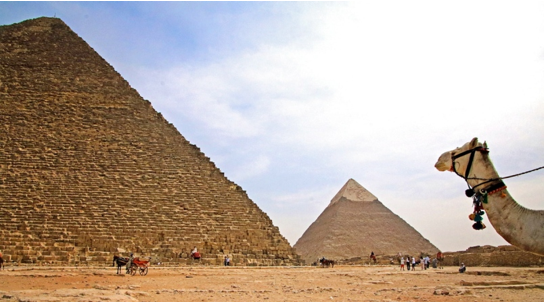
… We all need to grant ourselves the time and the peace to climb that spiritual pyramid inside each one of us…
In the summer of 1969, just after my eighteenth birthday, I was enjoying my first experience of tropical jungles. I was travelling in the Yucatán peninsula of Guatemala, heading for the recently discovered pyramids of the vanished Mayan civilization.
Hè 1969, tôi vừa tròn 18. Tôi được sang bán đảo Yucatan ở Guatemala để xem các kim tự tháp của nền văn minh maya (Nền văn minh Maya trải dài từ 2000 trước công nguyên đến 250 sau công nguyên, được tìm thấy trong vùng gồm Nam Mễ Tây Cơ, bán đảo Yucatan và Bắc Trung Mỹ). Kim tự tháp vừa được khám phá trong rừng già và là môi trường nguyên sinh mà tôi được thiện duyên đặt chân đến lần đầu tiên.
In those days, travel was difficult. It took me three or four days to cover the few hundred kilometers from Guatemala City to the ruined temple complex known as Tical. I travelled up narrow rainforest rivers on oil-soaked fishing boats, down winding dirt roads balanced precariously on top of heavily loaded trucks, and through small jungle paths on rattling, ramshackle rickshaws. It was a region remote, poor and pristine.
Lúc bấy giờ đường đi rất trắc trở. Tôi phải mất bốn ngày mới qua hết đoạn đường vài trăm cây số từ thủ đô Guatemala đến khu di tích, khu Tical. Tôi phải vượt suối bằng ghe câu nhỏ lem luốc dầu mỡ bẩn thỉu và băng rừng lúc trên xe vận tải đầy nhóc hàng hóa lắc lư trên đường đất ngoằn ngoèo, lúc trong xe máy ba bánh cọc cạch leo dốc không muốn nổi.
When I finally arrived at the extensive complex of abandoned temples and ancient pyramids, I had neither guide nor guidebook to tell me the meaning of those impressive stone monuments pointing to the sky. Nobody was around. So, I started climbing one of the tall pyramids. On reaching the top, the meaning and spiritual purpose of these pyramids became suddenly clear to me.
Khu di tích lịch sử Tical mênh mông, gồm nhiều đền đài và kim tự tháp cổ, nhưng rất heo hút và hoang vắng. Lúc đến nơi tôi không thấy một bóng người nên phải tự xoay xở lấy một mình. Tôi leo một trong những tháp cao nhất và lên tới đỉnh. Tôi chợt nhận chân được giá trị tinh thần và ý nghĩa uyên ảo của các tháp này.
For the previous three days, I had been travelling exclusively through jungle. The roads, paths and rivers were like tunnels through the dense greenery. Jungle quickly made a ceiling above any new thorough fare. I hadn’t seen the horizon for many days. Indeed, I hadn’t seen far distances at all. I was in jungle.
On top of that pyramid, I was above the tangle of the jungle. Not only could I see where I was in the map-like panorama laid out before me, but I could now see in all directions, with nothing between infinity and me.
Standing up there, as if on top of the world, I imagined what it might have been like for young Mayan Indians who had been born in the jungle, raised in the jungle and lived all their life in the jungle. I pictured them in some religious rite of passage being led gently by the hand, by a wise old holy man, up to the summit of a pyramid for the very first time. When they rose above the tree line and beheld their jungle world unfolded and spread out before them, when they gazed beyond the limits of their territory to the horizon and what lies beyond, they would see the great embracing emptiness above and around. Standing on the point of the pyramid, in the doorway between heaven and earth, there would be no person, nothing, no word between them and the infinite in every direction. Their heart would resonate with the striking symbolism of the scene. Truths would flower and send forth the fragrance of knowing. They would understand their place in their home world, and they would have seen the infinite, the freeing emptiness, which embraces it all. Their life would have found its meaning.
Trên đỉnh tôi nhìn thấy bốn bề mênh mông mút tận chân trời. Tôi hình dung một chàng trai Maya hằng ngày sống dưới lớp tàn cây cổ thụ không thấy trời mây, bỗng dưng đứng trên kim tự tháp cao chót vót, nhìn bầu trời bao la, tưởng chừng mình đang ở giữa thiên đường và hạ giới. Chắc chắn anh bừng tỉnh, biết thế nào là hư vô, chân lý là gì, và cuộc sống có ý nghĩa làm sao.
We all need to grant ourselves the time and the peace to climb that spiritual pyramid inside each one of us, to rise above and beyond the tangled jungle that is our life, if only for a short time. Then we may see for ourself our place among things, the overview of our life journey, and gaze unimpeded at the infinite in every direction.
Cũng vậy, chúng ta hãy dành cho mình thời gian, dầu chỉ là một khoảnh khắc ngắn ngủi, để leo ngôi kim tự tháp, nội tại và đứng lên trên nóc rừng già chằng chịt của cuộc sống. Bấy giờ chúng ta mới nhận thức được vị trí của chúng ta trên đoạn đường đời chúng ta dấn bước và hư không vô tận chung quanh chúng ta.
78. Precious stones - Đá cuội

Is the jar full of precious stones? - Please ensure that you schedule in the ‘precious stones’ first, or you’ll never get around to them, to fit them into your day.
At a famous US business school some years ago, a professor delivered an extraordinary lecture on social economics to his graduate class. Without explaining what he was doing, the professor carefully placed a glass jar on his desk. Then, in view of his students, he brought out a bag full of stones and placed them one by one in the jar, until no more would go in. He asked his students, ‘Is the jar full?’
Tại một đại học nổi tiếng nọ ở Hoa Kỳ có ông giáo nghĩ ra một phương pháp sư phạm hết sức độc đáo. Một hôm, ông đem vô lớp cao học kinh tế xã hội một cái hủ và một túi đá cuội. Sinh viên ngạc nhiên thấy ông cẩn thận lấy đá bỏ từng viên vào hủ. Lúc không còn nhét đá vô nữa ông hỏi:
‘Yes,’ they replied.
The professor smiled. From beneath the desk, the professor produced a second bag, this one full of gravel. He then managed to shake the smaller stones into the space’s bigger stones in the jar. A second time, he asked the students, ‘Is the jar full?’
“Hủ đá đầy chưa, các bạn?”
Tất cả đồng thanh trả lời:
“Thưa đầy rồi.”
Ông cười. Đoạn ông lấy trong cặp ra túi sỏi và bỏ sỏi vô các kè đá. Xong ông hỏi;
“Hủ bây giờ đầy chưa?”
Biết mẹo của ông rồi, nhiều sinh viên thưa:
‘No,’ they answered. They were on to him by now.
They were correct, of course, for the professor produced a bag of fine sand. He managed to coax much of the sand into the spaces between the stones and the gravel within the jar. Again, he asked, ‘Is the jar full?’
‘Probably not, Sir, knowing you,’ the students replied.
“Chưa.”
Họ trả lời đúng vì ông giáo vừa đổ thêm cát vừa lắc, và cát lọt xuống tận đáy hủ, bấy giờ ông cười nói:
“Chắc đã đầy rồi phải không?”
“Thưa, cũng chưa chắc!”
Smiling at their answer, the professor brought out a small jug of water, which he poured into the jar full of stones, gravel and sand. When no more water would fit in the jar, he putdown the jug and looked at his class.
‘So, what does this teach you?’ he asked his students.
‘That no matter how busy your schedule,’ offered one of the students, ‘you can always fit something more in!’ It was a famous business school, after all.
Đúng vậy, ông giáo từ từ mở nút chai, đổ thêm nước vô hủ cho đến khi nước tới miệng hủ mới thôi. Ông quay xuống sinh viên hỏi:
“Thí nghiệm vừa qua dạy chúng ta điều gì?”
Một sinh viên nhanh nhẩu đáp:
“Dầu có bận rộn thế mấy đi nữa, chúng ta cũng có thể thêm công tác cho một ngày làm việc của chúng ta.”
‘No!’ thundered the professor emphatically. ‘What it shows is that if you want to get the big stones in, you have to put them in first.’ It was a lesson in priorities.
“Không hẳn vậy,” ông nói tiếp, “nếu muốn bỏ đá cuội vô hủ, chúng ta phải bỏ chúng trước.” Đây là một bài học về “ưu tiên”.
So, what are the ‘big stones’ in your ‘jar’? What is most important to fit in to your life? Please ensure that you schedule in the ‘precious stones’ first, or you’ll never get around to them, to fit them into your day.
Vậy cái gì được xem như “đá cuội” trong “hủ” của bạn? Là các điều quan trọng nhất đối với cuộc đời bạn?
79. Then I’ll be happy - Rồi tôi sẽ hạnh phúc
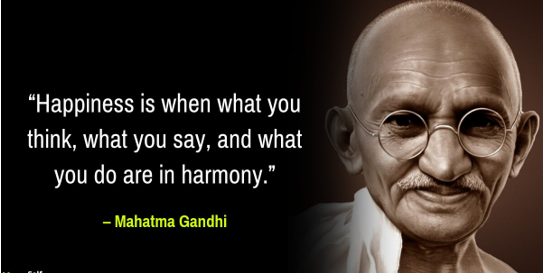
When we have no happiness inside us, we have no happiness to give to others.
Perhaps the most precious of stones to have in our ‘jar’ early, as in the previous story, is inner happiness. When we have no happiness inside us, we have no happiness to give to others. So why do so many of us give such low priority to happiness, postponing it to the very end? (Or even after the very end, as the following story will show.)
Đá quý nhất mà chúng ta bỏ vô hủ hẳn là hạnh phúc nội tại. Nếu chúng ta không có hạnh phúc chúng ta không thể nào giúp người khác hạnh phúc được. Biết vậy, tại sao chúng ta lại thờ ơ với hạnh phúc của chính mình?
When I was fourteen years old, I was studying for my O-level examinations in a high school in London. My parents and teachers advised me to stop playing soccer in the evenings and weekends—to stay at home instead giving the time to my homework. They explained how important the O-level exams were and that if I did well, then I’d be happy.
Năm tôi 14, tôi thi lên cấp O (tương đương với trung học cơ sở) của một trường trung học tại Luân Đôn. Vì học thi, cha mẹ và thầy tôi khuyên tôi nên ngưng đá banh, môn thể thao tôi thích chơi mỗi tối và cuối tuần. Tôi cần dành thì giờ cho bài vở trước. Vả lại kỳ thi tới rất quan trọng, nếu đậu tôi mới thật sự vui sướng.
I followed their advice and did very well. But it didn’t make me that happy, because my success meant that now I must study even harder, for another two years, for the A-level exams. My parents and teachers advised me to stop going out in the evenings and weekends, to stop chasing girls now rather than chasing a football, and to stay at home instead and study. They told me how important the A-level exams were and that if I did well, then I’d be happy.
Tôi nghe lời khuyên và thi đậu. Nhưng tôi nào thấy vui sướng gì đâu vì tôi phải lo học nhiều hơn trong hai năm tới để thi cấp A (tương đương với tú tài). Rồi một lần nữa tôi được cha mẹ và thầy khuyên như trước đây. Bấy giờ thay vì đừng chạy theo banh tôi được biểu đừng chạy theo “bồ” để có thì giờ học. Và tôi sẽ mãn nguyện khi đậu cấp A.
Once again, I followed their advice and did very well. Once again, it didn’t make me very happy. Because now I had to study hardest of all, for three more long years, for a degree at a university. My mother and teachers (my father was now dead) advised me to steer clear of the bars and parties in college, but instead to work hard and long at my studies. They told me how important a university degree was, and that if I did well, then I’d be happy.
Một lần nữa tôi nghe lời khuyên và thành công. Nhưng mãn nguyện đâu chẳng thấy, tôi chỉ thấy ba năm nhọc nhằn sắp tới của chương trình đại học. Cùng một luận điệu như trước đây, mẹ và thầy cô khuyên tôi cố gắng học hành và tránh xa các tiệc tùng, rượu chè trong trường, để sẽ được sung sướng khi nắm trong tay mảnh bằng đại học.
At this point, I started to become suspicious.
Xong đại học tôi bắt đầu nghi ngờ.
I saw some of my older friends who had worked very hard and got their degree. Now they were working even harder in their first job. They were working extremely hard to save up enough money to buy something important, say, a car. They told me, ‘When I have enough money to buy a car, then I’ll be happy.’
When they had enough funds and had bought their first car, they still weren’t happy. Now they were working hard to buy something else, and then they’d be happy. Or they were struggling in the turmoil of romance, looking for a partner in life. They told me, ‘When I get married and settle down, then I’ll be happy.’
Once married, they still weren’t happy. They had to work even harder, even taking extra jobs, to save up enough money for a deposit on an apartment, or even a small house. They told me, ‘When we have bought our own house, then we’ll be happy.’
Unfortunately, paying off the monthly instalment for the house loan meant that they still weren’t very happy. Moreover, they would now start a family. They would have children to wake them up at night, swallow up all their spare money and increase their worries in quantum leaps and bounds. Now it would be another twenty years before they could do what they wanted. So, they told me, ‘When the kids are grownup, have left home and settled, then we’ll be happy.’
By the time the kids had left home, most of the parents were staring at retirement. So, they continued to postpone their happiness, working hard to save for their old age. They told me, ‘When I retire, then I’ll be happy.’
Tôi thấy nhiều bạn tốt nghiệp làm việc còn vất vả hơn. Họ cố gắng làm ra tiền để mua hạnh phúc, chiếc xe chẳng hạn. Có xe rồi, họ nghĩ họ sẽ hạnh phúc khi có vợ đẹp. Có vợ như ý muốn nhưng họ vẫn còn hớt hơ hớt hải chạy tìm hạnh phúc. À, phải sắm cái nhà mới có hạnh phúc. Thế là họ làm đầu tắt mặt tối để có đủ tiền mua nhà. Chưa xong, phải có con và thức khuya dậy sớm lo cho con, lo lắng của họ chồng chất. Rồi họ tự an ủi, “Hai mươi năm nữa lúc con lớn khôn, ta sẽ tự do hưởng hạnh phúc vậy.” Con ra đời bay nhảy, cha mẹ thui thủi một mình lo chắt chiu để về hưu trong hạnh phúc.
Even before they retired, and certainly after, they started becoming religious and going to church. Have you ever noticed how many old people occupy the pews in a church? I asked them why they were now going to church. They told me, ‘Because, when I die, then I’ll be happy!’
Về hưu – có khi cả trước lúc họ hưu – họ bắt đầu đi chùa. Thảo nào chúng ta thấy nhà chùa thường đông người cao tuổi. Trước Phật đài họ vẫn van vái xin được về cõi Tây phương cực lạc để được hạnh phúc vĩnh hằng.
For those who believe that ‘When I get this, then I’ll be happy’, their happiness will be just a dream in the future. It will be like a rainbow one or two steps ahead, but forever just out of reach. They will never in their life, or after, realize happiness.
Ai nghĩ rằng: “Tôi sẽ hạnh phúc khi được cái này hay cái kia”, người ấy chỉ sống trong “mộng tưởng điên đảo”. Họ chỉ mơ không bao giờ biết hạnh phúc là gì!
80. The Mexican fisherman - Ông Câu Mễ Tây Cơ
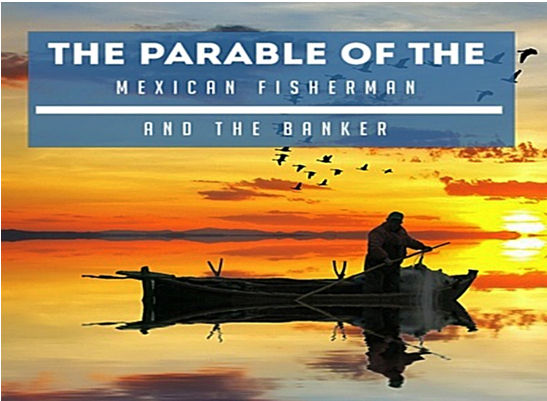
Chuyện ngụ ngôn Ngư phủ Mễ Tây Cơ và nhà đầu tư Ngân Hàng
In a quiet Mexican fishing village, an American on vacation was watching a local fisherman unload his morning catch. The American, a successful professor at a prestigious US business school, couldn’t resist giving the Mexican fisherman a little bit of free advice.
Một sáng nọ có một ông du khách Mỹ lửng thửng xuống bến cá Mễ xem cho biết sự tình. Thấy ông câu chuyển giỏ cá lên bờ, ông cầm lòng không đậu nên gọi ông câu cho vài lời khuyên.
‘Hey!’ began the American. ‘Why are you finishing so early?’
‘Since I have caught enough fish, Señor,’ replied the genial Mexican, ‘enough to feed my family and a little extra to sell. Now I will take some lunch with my wife and, after a little siesta in the afternoon, I will play with my children. Then, after dinner, I will go to the cantina, drink a little tequila and play some guitar with my friends. It is enough for me, Señor.’
“Ông câu ơi, sao ông vô bờ sớm vậy?”
“Senor (Senor là tiếng Mễ có nghĩa là Ông), đủ rồi” ông câu vừa chỉ cá trong giỏ vừa đáp. “Mẻ cá này dư cho gia đình tôi ăn hôm nay, còn có thể bán bớt đi một ít nữa là khác.”
Có vẻ ngạc nhiên, ông khách hỏi:
“Biển êm dễ câu, sao không ở lại kiếm thêm?”
Ông câu giải thích: “Tôi về để ăn cơm với gia đình cho vui, ngủ trưa một giấc rồi giỡn với mấy cháu nội, cháu ngoại. Chiều xuống câu lạc bộ nhậu chút rượu tequila (Tequila là rượu đặc sản Mễ Tây Cơ, được cất từ cây dứa xanh Agave tequila, Weber. Giống như rượu đế Việt Nam) và đờn ca vài bản giải trí cùng bạn bè. Đời như vậy là đủ, đủ lắm rồi, Senor!”
‘Listen to me, my friend,’ said the business professor. ‘If you stay out at sea until late afternoon, you will easily catch twice as much fish. You can sell the extra, save up the money, and in six months, maybe nine, you’ll be able to buy a bigger and better boat and hire some crew. Then you’ll be able to catch four times as many fish. Think of the extra money you will make! In another year or two, you will have the capital to buy a second fishing boat and hire another crew. If you follow this business plan, in six or seven years you will be the proud owner of a large fishing fleet. Just imagine that! Then you should move your head office to Mexico City, or even to LA. After only three or four years in LA, you float your company on the stock market giving yourself, as CEO, a generous salary package with substantial share options. In a few more years—listen to this! — you initiate a company share buy-back scheme, which will make you a multi-millionaire! Guaranteed! I’m a well-known professor at a US business school. I know these things.’
“Nè ông bạn ơi!” ông khách bắt đầu giảng, “Nếu ông ra khơi tới chiều ông có thể câu gấp đôi, ông kiếm được nhiều tiền hơn. Sáu hay chín tháng sau ông có thể sắm được tàu lớn và mướn thêm nhân công phụ giúp cho đỡ mệt. Rồi ông sẽ ra xa bờ, đánh được nhiều cá và cá to. Trong vài năm ông có thể mua thêm tàu thứ 2. Và nếu ông cứ tiếp tục như vậy không mấy hồi ông sẽ làm chủ một đội tàu đánh cá”. Không để ông câu mở miệng, ông khách giảng tiếp: “Bấy giờ ông có thể chuyển qua Mỹ, qua Mexico City hay Los Angeles, lập công ty, lên sàn chứng khoán và giàu to. Tôi biết chắc như vậy. Tôi nói thiệt. Đây là lời của một đại giáo sư kinh tế Mỹ đó ông à!”
The Mexican fisherman listened thoughtfully at what the animated American had to say. When the professor had finished, the Mexican asked him, ‘But, Señor Professor, what will I do with so many millions of dollars?’
Sau khi nghe ông giáo sư ba hoa và đợi ông dứt lời, ông câu hỏi: “Nhưng giáo sư ơi, tôi sẽ làm gì với triệu đôla đó?”
Surprisingly, the American professor hadn’t thought the business plan through that far. So, he quickly figured out what a person would do with millions of dollars.
Thấy chương trình mình hoạch định cho ông câu chưa đầy đủ, ông giáo sư vội nói thêm:
‘Amigo! With all that dough, you can retire. Yeah! Retire for life. You can buy a little villa in a picturesque fishing village like this one, and purchase a small boat for going fishing in the morning. You can have lunch with your wife every day, and a siesta afterwards with nothing to worry you. In the afternoon you can spend quality time with your kids and, after dinner in the evening, play guitar with your friends in the cantina, drinking tequila. Yeah, with all that money, my friend, you can retire and take it easy.’
“Ông bạn của tôi ơi! Ông có thể về hưu, hưu sớm và vĩnh viễn. Rồi ông sẽ mua biệt thự nho nhỏ trong làng chài thơ mộng như làng này nè và mua du thuyền để mỗi sáng đi câu chơi, trưa về ăn cơm với gia đình và ngủ nghỉ không còn âu lo cho tương lai nữa. Xế ông vui đùa với con cháu. Tối, sau khi cơm nước xong, ông có quyền nhấm nháp tequila và đờn ca vui chơi với bè bạn. Những ngày hưu của ông chắc chắn sẽ tuyệt vời lắm đó.”
‘But, Señor Professor, I do all that already.’
Why do we believe that we have to work so hard and get rich first, before we can find contentment?
Ông câu cười rồi chậm rãi nói: “Ông giáo sư ơi, tôi đang sống như ông nói nè!”
Ở đời, tại sao chúng ta phải dốc hết công sức ra để mong giàu sang, quyền cao chức trọng trong lúc quên đi cuộc sống hiện tại mà chúng ta đang mãn nguyện.
81. When all my wishes were fulfilled - Không mong muốn: Mãn nguyện trọn vẹn
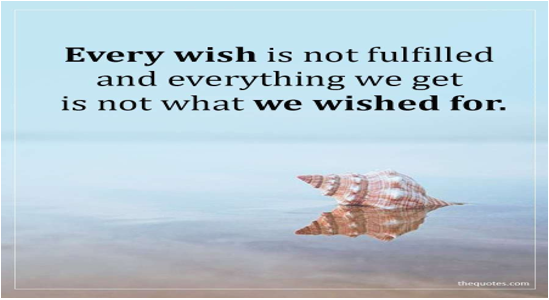
When I had no money, nor the means to get anything, that was the time when all my wishes were fulfilled.
In my tradition, monks aren’t allowed to accept, own or handle any money, whatever its kind. We are so poor that we mess up government statistics. We live frugally on the unsolicited, simple gifts from our lay supporters. However, infrequently we may be offered something special.
Truyền thống của tông phái Theravada tôi không bao cho phép sư nhận, giữ hay có tiền. Chúng tôi không tiền nên làm đảo lộn hết các thống kê của tổng sản lượng quốc gia, xin lỗi!
Sư chúng tôi sống nhờ vào sự bố thí của bá tánh. Tuy nhiên đôi khi chúng tôi vẫn nhận được nhiều món cúng dường quý hiếm.
I had helped a Thai man with a personal problem. Out of gratitude, he said to me: ‘Sir, I would like to give you something for your personal use. What can I get you for the amount of five hundred baht?’ It was usual to quote the amount when making such an offering, to avoid any misunderstanding. Since I couldn’t think what I wanted straight away and he was in a hurry, we agreed that I could tell him the next day when he returned.
Tôi có lần giúp cho một tín chủ người Thái giải quyết một số vấn đề gia đình của ông. Ông hết lời cám ơn tôi và nói:
“Thưa sư, con muốn xin được kính cúng dường sư một món quà cần thiết đáng giá lối năm trăm đồng.” Cung dường, người Thái hay nói lên giá tiền của món quà để tránh mọi hiểu lầm về sau. Vì không nghĩ ra ngay món gì tôi cần và thấy ông cần đi gấp, tôi đề nghị sẽ nói với ông vào ngày hôm sau khi ông trở lại chùa.
Before this occurred, I was a happy little monk. Now I started to contemplate what I wanted. I made a list. The list grew. Soon, five hundred baht wasn’t enough. But it was so difficult to take anything off the list. Wants had appeared out of nowhere and solidified into absolute necessities. And the list kept growing. Now, five thousand baht wasn’t sufficient!
Trước đó tôi rất hoan hỷ nhưng bây giờ tôi cứ canh cánh nghĩ đến những thứ mà tôi cần. Tôi bèn lập một danh sách, và danh sách cứ dài thườn thượt, vượt ra ngoài khả năng mua sắm của năm trăm đồng Thái. Tôi định bớt ra nhưng không biết bớt món nào. Ước muốn thoạt tiên rất mông lung song sau cùng cũng cô đọng được thành nhu yếu!
Seeing what was happening, I threw my wish list away. The next day, I told my benefactor to give the five hundred baht to the monastery building fund or to some other good cause. I didn’t want it. What I wanted most of all was to regain the rare contentment I had had the day before. When I had no money, nor the means to get anything, that was the time when all my wishes were fulfilled.
Nhưng nhận thức được sự mâu thuẫn này, tôi bèn xé bỏ bảng danh sách. Hôm sau tôi xin thí chủ cúng dường cho quỹ xây cất tự viện hoặc cho cơ quan từ thiện nào cũng được. Thật sự tôi không muốn gì hơn là sự mãn nguyện mà tôi từng có trước phút tôi được thí chủ đề nghị cúng dường tôi vật dụng đáng giá năm trăm đồng Thái. Lúc không có tiền hay không có phương tiện thủ đắc cho riêng mình là khi ước muốn của tôi đã được như ý.
Wanting has no end to it. Even one billion baht isn’t enough, nor one billion dollars. But freedom from wanting has an end. It is when you want for nothing. Contentment is the only time you have enough.
Ham muốn không có lúc dừng. Một triệu đồng Thái hay cả một triệu đôla cũng không thể gọi là đủ cho tâm tham. Nhưng tâm không tham biết đúng lúc dừng. Đó là lúc tâm không muốn gì hết. Không muốn gì hết đem lại sự mãn nguyện trọn vẹn.
Sources:
Tài liệu tham khảo:
- https://tienvnguyen.net/p147a886/chuong-9-
- https://www.bps.lk/olib/bp/bp619s_Brahm_Opening-The-Doors-Of-Your-Heart.pdf
- Photo 2: https://media.radiosai.org/journals/Vol_06/01FEB08/12-violin.htm
- Photo 3: http://www.quotespedia.info/quotes-about-flowers-what-in-name-that-which-we-call-rose-by-any-other-name-would-smell-as-sweet-a-4613.html
- Photo 4: https://www.timescolonist.com/travel/exploring-pyramid-power-in-egypt-1.23315191
- Photo 5: https://www.istockphoto.com/photo/full-to-the-top-glass-jar-with-semiprecious-stones-isolated-on-white-background-gm910360626-250712289
- Photo 6: https://www.yourselfquotes.com/mahatma-gandhi-quotes/
- Photo 7: https://ingliando.net/2016/05/13/the-fisherman-and-the-banker/
- Photo 8: https://wrytin.com/vishaljain/not-every-wish-is-fulfilled-jw6mcstz


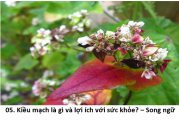
![[7-12] - Chuyện Vui Ngắn - Short Funny Stories – Song ngữ [7-12] - Chuyện Vui Ngắn - Short Funny Stories – Song ngữ](/images/resized/59b514174bffe4ae402b3d63aad79fe0_7-12._title_224_120.png)
![[13-20] - Chuyện Vui Ngắn - Short Funny Stories – Song ngữ [13-20] - Chuyện Vui Ngắn - Short Funny Stories – Song ngữ](/images/resized/fa447a14965dfd70772de1948c4d467d_13-20._title_224_120.png)
